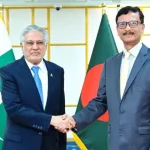ISLAMABAD: Attorney General (AG) Ashtar Ausaf Ali and his team of associates on Friday took stock of the initial pleadings — termed a ‘memorial’ — filed before the International Court of Justice (ICJ) by India on Sept 13 against the conviction of Indian spy Kulbhushan Jadhav.
Friday’s meeting was the first convened since India filed its memorial, because the AG had been out of the country to attend meetings in Washington on water disputes with New Delhi and to attend to other developments.
Apart from the AG, who presided over the meeting, representatives of the Foreign Office and the Ministry of Law and Justice as well as other stakeholders were present.
Mr Ausaf told Dawn that they had decided to hold weekly meetings in order to review the situation and “to finalise Islamabad’s point of view and convert it into an appropriate rejoinder to India’s allegations”.
The ICJ, located at the Peace Palace in The Hague, has given Pakistan the deadline of Dec 13 to submit its counter-plea or counter-memorial, after which the final proceedings on the issue will commence. The ICJ is the principal judicial organ of the United Nations which was established in June 1945 by the Charter of the United Nations.
Jadhav was captured in Balochistan in March 2016. He confessed to his association with India’s Research and Analysis Wing (RAW) and his involvement in espionage and fomenting terrorism in Pakistan. Earlier in 2017, the Field General Court Martial (FGCM) sentenced him to death, which was confirmed by Chief of the Army Staff Gen Qamar Bajwa on April 10 this year.
Through an interim order issued on May 18, the ICJ stayed Jadhav’s execution, and the Foreign Office informed the ICJ that the government of Pakistan had instructed its relevant departments to effect the May 18 order of the international court.
The ICJ registrar was informed by the Ministry of Foreign Affairs in Islamabad on July 5 that the AG would act as the agent for Pakistan in the case, while Foreign Affairs Director General Dr Mohammad Faisal would continue to act as the co-agent.
In ICJ parlance, the term ‘agent of Pakistan’ means a top functionary of the government who leads a delegation to represent the country’s perspective and usually opens the arguments or presents a framework followed by the legal team to argue the matter. This also means that all future exchange or information between Pakistan and the ICJ will be conducted through the office of the AG, since he has been appointed the agent of Pakistan.
Speaking to Dawn, Mr Ausaf said they were in touch with the relevant stakeholders, including Khawar Qureshi who had pleaded Pakistan’s case at the initial stage, to formalise a robust reply refuting all allegations levelled against Pakistan.
The AG office is also busy documenting the case and collecting instances of the atrocities and human rights violations committed by India in held Kashmir.
Soon after a meeting with ICJ President Ronny Abraham and delegations of Pakistan and India in the Netherlands on June 8, Mr Ausaf informed the international court about Pakistan’s intention to appoint an ad-hoc judge to sit on the ICJ bench for all proceedings, including substantive hearings in Jadhav’s case.
Senior counsel Makhdoom Ali Khan or former chief justices Tassadduq Hussain Jillani maybe appointed the ad-hoc judge in the ICJ. This will be discussed in the next meeting.






